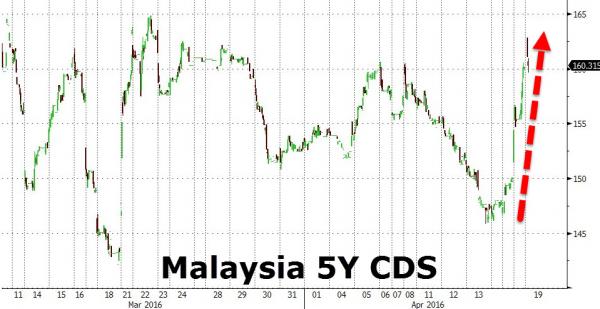Over the better part of the past year, we’ve documented the curious case of 1MDB, Malaysia’s government investment fund founded in 2009. It’s a long and exceptionally convoluted story that doesn’t exactly lend itself to a concise summary but suffice to say that the development bank was something of a black box right from the beginning and in 2013, some 0 million allegedly tied to 1MDB ended up in Malaysian PM Najib Razak’s personal bank account just prior to an election. There are any number of twists and turns in the 1MDB story including two bond offerings facilitated by a Goldman banker with ties to Najib and his wife, some shenanigans with a subsidiary of an Abu Dhabi sovereign wealth fund, a questionable Cayman Islands account or two, a dispute with KPMG, and an Australian firm that specialized in Malaysian penny stocks, but at the end of the day, Malaysians just want to know what exactly will come of an investigation into how Najib ended up with nearly three quarters of a billion dollars. A quick reminder on the Abu Dhabi connection. Back in September, as the WSJ reported, the corruption scandal around 1MDB spilled beyond the country’s borders, as officials at a United Arab Emirates state investment vehicle rose questions about more than a billion dollars in money that they said is missing.
Topics:
Tyler Durden considers the following as important: Abu Dhabi, Bond, CDS, Corruption, creditors, default, Featured, newsletter, None, Switzerland
This could be interesting, too:
Nachrichten Ticker - www.finanzen.ch writes Die Performance der Kryptowährungen in KW 9: Das hat sich bei Bitcoin, Ether & Co. getan
Nachrichten Ticker - www.finanzen.ch writes Wer verbirgt sich hinter der Ethereum-Technologie?
Martin Hartmann writes Eine Analyse nach den Lehren von Milton Friedman
Marc Chandler writes March 2025 Monthly
Over the better part of the past year, we’ve documented the curious case of 1MDB, Malaysia’s government investment fund founded in 2009.
It’s a long and exceptionally convoluted story that doesn’t exactly lend itself to a concise summary but suffice to say that the development bank was something of a black box right from the beginning and in 2013, some $680 million allegedly tied to 1MDB ended up in Malaysian PM Najib Razak’s personal bank account just prior to an election.
There are any number of twists and turns in the 1MDB story including two bond offerings facilitated by a Goldman banker with ties to Najib and his wife, some shenanigans with a subsidiary of an Abu Dhabi sovereign wealth fund, a questionable Cayman Islands account or two, a dispute with KPMG, and an Australian firm that specialized in Malaysian penny stocks, but at the end of the day, Malaysians just want to know what exactly will come of an investigation into how Najib ended up with nearly three quarters of a billion dollars.
A quick reminder on the Abu Dhabi connection. Back in September, as the WSJ reported, the corruption scandal around 1MDB spilled beyond the country’s borders, as officials at a United Arab Emirates state investment vehicle rose questions about more than a billion dollars in money that they said is missing.
Abu Dhabi had long been a source of support for the fund, 1Malaysia Development Bhd., which was set up six years ago by Malaysian Prime Minister Najib Razak to develop new industries in the Southeast Asian country. Then, in September, as 1MDB tries to fend off a cash crunch, its backers in Abu Dhabi are asking what happened to a $1.4 billion payment the fund said it made but which they never received, two people familiar with the matter said.
The disputed payments were related to the purchase of power plants around the world by the Malaysian fund in 2012. A state investment fund in Abu Dhabi, the International Petroleum Investment Co., or IPIC, guaranteed the $3.5 billion in bonds that 1MDB issued to finance the purchase, according to the bond offering documents. In return, IPIC was to receive options to buy a 49% stake in the power plants as well as collateral for the bond.
According to 1MDB’s financial statements, the Malaysian fund made a collateral payment of $1.4 billion. A draft report into 1MDB’s activities by Malaysia’s auditor general said the payment went to a subsidiary of IPIC called Aabar Investments PJS.
The problem is that IPIC’s consolidated financial statements contain no reference to the receipt of the payment. Two people familiar with the matter said IPIC and Aabar never received the money. It isn’t clear what happened to the funds. 1MDB didn’t respond to requests for comment.
Since then, even as more news revealed just how extensive the embezzlement and corruption surrounding 1MDB truly were with the explicit involvement of Malaysian PM Najib Razak, the Abu Dhabi money was never found.
* * *
Fast forward to today, when 6 months later, the question of Abu Dhabi’s missing money has resurfaced with a bang, and suddenly threatens to drag down not only 1MDB but the entire Malaysian state.
As the FT reports, the dispute between an Abu Dhabi sovereign fund and Malaysia’s troubled state fund 1MDB over more than $1bn in missing payments hit a crescendo on Monday when the Emirates investment vehicle said its Malaysian counterpart was “in default” on an agreement between the two and terminated the deal.

The catalyst was a filing on the LSE made on Monday according to which the Gulf emirate’s abovementioned International Petroleum Investment Company (IPIC) ended its relationship with its Southeast Asian counterpart.
The Abu Dhabi fund said 1MDB and Malaysia’s ministry of finance were in default on the deal, including an obligation to pay $1.1bn plus interest, and that 1MDB continued to be bound by its commitments under the agreement.
In short, Abu Dhabi wants its money and is willing to push 1MDB in default to get it.
Ipic was now considering options to remedy the alleged default, including referring the matter to the appropriate dispute resolution forum, it added in its regulatory filing.
Furthermore, Ipic and its Aabar subsidiary issued a London Stock Exchange statement last week in which they denied ownership of Aabar Investments PJS Ltd, a company that received billions of dollars in payments from 1MDB. Ipic and Aabar said in the filing that they were aware of reports that “substantial payments” were made to that company, which is incorporated in the British Virgin Islands, another offshore tax haven. They also said they had received no payments from the company and received no liabilities on its behalf.
Swiss Authorities: indications that $4bn have been misappropriated from Malaysian state companies
The move is the latest twist in an affair that has buffeted Malaysia’s government and prompted investigations in at least five countries including the US and Switzerland.
To be sure, the case shouldn’t be very difficult to prosecute since Malaysia appears to have run out of goodwill with another critical counterparty, Switzerland after Swiss authorities said they have found “serious indications” that about $4bn has been misappropriated from Malaysian state companies. They widened their investigation last week to look at the roles of two former officials with responsibility for Abu Dhabi sovereign funds.
For its part, the FT adds, 1MDB said in a that interest was payable on Monday on its $1.75bn 2022 bonds. The Malaysian fund said that a “dispute has recently arisen” between the two funds and that Ipic had not paid the interest.
The 1MDB statement went on: “1MDB wishes to make clear that it and its group entities will meet all of their other obligations under any other financing arrangements and have ample liquidity to do so.”
Malaysia’s finance ministry said in a statement on Monday that it would “continue to honour all of its outstanding commitments in the financial markets”.
In short, nobody really knows what is going on as Christian de Guzman, a credit analyst at Moody’s in Singapore, confirmed. “There’s a lot of uncertainty about what’s going on, but one thing is clear — progress on 1MDB’s debt rationalisation has been cast into doubt.”
Alas, the situation will only deteriorate from here.
As a reminder, it is none other than Najib Razak, Malaysia’s prime minister, who heads 1MDB’s advisory board. The PM has battled allegations centred on $681m transferred to his personal bank account, which critics claim is linked to 1MDB. Both Mr Najib and 1MDB deny wrongdoing and the prime minister has been cleared by Malaysia’s attorney-general. Which means that for any resolution to be reached on the missing funds it would involve the implication of the prime minister, which would therefore mean that creditors of 1MDB have an awkward choice: write off their exposure, or pursue the funds with the risk of unleashing another political crisis.
To get a sense of just how deep the Malaysian corruption rabit hole goes, consider that Nazir Razak, Najib’s brother, announced on Monday that he was taking a voluntary leave of absence from his role as chairman of CIMB, Malaysia’s second-biggest bank by assets, while a review took place into transfers into his own personal account. The move follows reports that he received $7m ahead of the 2013 elections in Malaysia.
In other words, everyone was stealing, the only question is how much, and whether those who actually owe the money will come looking for it.
And while bankers in Kuala Lumpur say that while the alleged default is unlikely to threaten Malaysia’s sovereign rating, as the risk from 1MDB is already factored in, it will hamper efforts to contain the political scandal around the affair.
Markets, however, beg to differ and following the news of 1MDB’s alleged default, Malaysia 5 year CDS spiked by 11 bps, the most since March 21, to 163 bps as the market starts to quietly ask whether this ongoing scandal may just drag down the entire Malaysian state.

